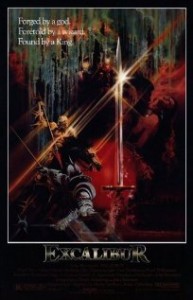![]()
 We’ve seen a lot of class and race tidbits, and DM options when it comes to setting our D&D Next complexity slider right where we want it.
We’ve seen a lot of class and race tidbits, and DM options when it comes to setting our D&D Next complexity slider right where we want it.
Modular D&D is on its way so we can play whatever style or complexity level of D&D that suits our playgroups best for any particular game or campaign – and that’s a great thing!
And yet there’s one other important thing when it comes to complexity that’s really ramped up in 4e: magic items are very much styled like powers, and like powers, have a large range of complexity as well.
That’s one thing I wish there was more information on right now for D&D Next: magic item complexity. (And by all means, if you’ve found and newsworthy bits on D&D magic items and their complexity, share them with me, please!
This morning, I was doling out a treasure horde for last night’s D&D adventure’s heroics for a new, every month or two special campaign that includes a couple of new players and friends of mine. As I was going through the potential magic items to give out using the online Compendium, it struck me how varied the complexity was for magic items.
Here I am weighing the pros and cons of populating the big end-of-adventure treasure chest with simple, rare-impact magic items with few words vs. more conditional wall-of-text style ones. The party: a group of 3 veteran players, 1 new to D&D 4e, and 1 new to D&D and RPGs altogether. The question as I go through the online Compendium: what are the most exciting yet most usable magic treasures for the characters?
Now, as you might know already, I get play as well as DM D&D – by far more often in 4e than any other edition before it. So that perspective helps me a lot – especially when I’m teaching the game. I know what to watch out for, complexity-wise. What rules to focus on and give new players some practice with, and what rules to lax a bit while they learn the basics.
Typical class powers – especially encounter and dailies – have plenty of conditions, triggers, limitations and “things to have to watch for” as it is. Nevermind some magic item “treasure” that’s thrown into the mix. More reading, more absorbing… and for someone new, likely more forgetting you even have it! Which of course, is the greatest tragedy of all: being overwhelmed.
But it’s worse than being overwhelmed, isn’t it? That kind of information overload also leads to combat slog, and if that goes on long enough, immersion breaking like a shattered mirror while endless calculations devour session time at alarming rate and streams of numbers spew forth unchecked from the assembled mouths around the table.
And if there’s anything I hate more than being overwhelmed with too-complex or situational attacks and powers (whether as a DM or player, or seeing other players’ eyes glaze over because of it), it’s these same powers nuking the heart of what the D&D game is supposed to be: fast-paced and exciting combat, roleplaying, and storytelling, all rolled into one.
It’s a fine balance to achieve, and yet that balance is what makes a great D&D experience. Will D&D Next’s complexity sliders apply to magic items as well? Will they be categorized as Simple, Moderate, and Complex? I hope so, because Common, Uncommon and Rare still aren’t quite right yet, even though they’re on the right path and do touch on item complexity while also weaving in story explanations for their rarities.
Give me a more powerful Compendium filter to filter out “wall of text” or filter in “crit-based features only” for magic item properties or powers, and now we’re talking! If not in 4e, then definitely for D&D Next. That will make awarding the right complexity of magic items so much easier.
More enchanted weapons like Aftershock Longswords or Relentless Mauls or magical boots like Acrobat Boots for my game, please. Simple, easy-to-track, wonderously helpful, and powerful. Crit-based and simple passive properties? No new numbers or penalties to remember or track? Smooth, cinematic feel and gameplay? Yes! More of these please!
Magic item complexity impacts everyone’s turn and fun, not just the owners of a complex item. Remember, we have to wait for you to make sense of it and do your calculus to make sure it’ll help you right now. It’s the same exact issue with complex or overly administrative and burdensome-to-track-or-execute attack powers. Wondrous magic items? Doesn’t sound very wondrous, does it?
Now Mordenkainen’s Magnificent Emporium brought some of the magic back to magic items with its expanded lore, but another way to bring back their classic wonder is to also make sure there’s a wide selection that aren’t overly complex or cumbersome to read and use, yet powerful and easy to find and include as a DM. We need more “always-on” passive abilities and less modifiers and conditional riders to track.
How do you think magic item complexity should be addressed in D&D Next? Does a clear, identifable, filterable slider approach make sense here too? How important is modular magic item complexity to you compared to class and power or attack complexity?